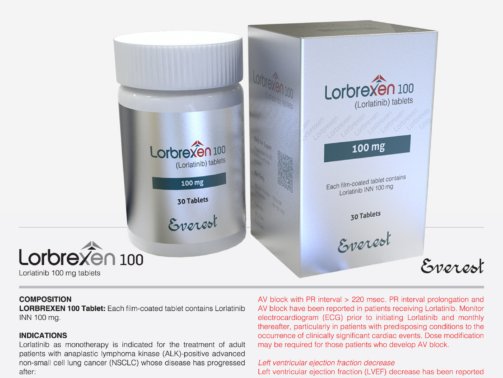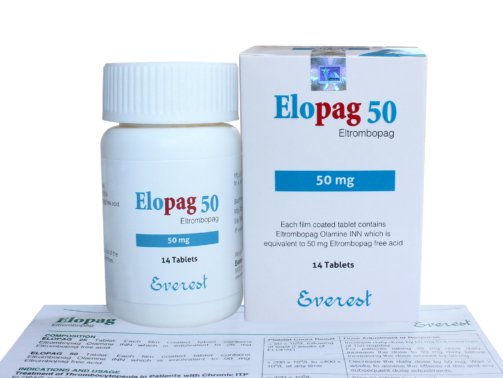Lorlatinib 100 mg (Lorbrena)
0.00$
Lornatib (Lorlatinib) 100 mg is a medication primarily used in the treatment of non-small cell lung cancer (NSCLC), particularly in patients with specific genetic mutations. It falls under the category of tyrosine kinase inhibitors (TKIs), which target abnormal proteins involved in cancer cell growth and proliferation. Lornatib 100 mg offers a targeted therapy option for patients with NSCLC, helping to inhibit tumor progression and improve overall survival rates.
Lorlatinib created the targeted medication lorlatinib, which is sold under the brand name Lorbrena, to treat non-small cell lung cancer (NSCLC) that is typified by particular genetic changes. This drug provides a fresh line of defense against the advancement of the disease and is especially useful when the malignancy has become resistant to previous therapies.
Composition and Mechanism of Action
A third-generation tyrosine kinase inhibitor (TKI), lorlatinib, is intended to specifically block c-ros oncogene 1 (ROS1) and anaplastic lymphoma kinase (ALK) rearrangements. Certain NSCLC tumors are known to grow as a result of these genetic changes. Lorlatinib inhibits the signaling pathways that support the growth and survival of cancer cells by specifically targeting these kinases. Notably, lorlatinib is a useful treatment for individuals with brain metastases since it has been designed to efficiently cross the blood-brain barrier.
Dosage and Administration
Lorlatinib 100 mg (Lorbrena) is the usual dosage, and it can be taken orally once a day with or without food. Instead of chewing, crushing, or splitting the tablets, they should be consumed whole. To sustain therapeutic medication levels, daily ingestion must be consistent. Unless the following dose is due in four hours, in which case the missed dose should be avoided, if a dose is missed, it should be taken as soon as possible. Patients should take the next planned dose instead of taking another one if they throw up after taking one. Depending on a person’s tolerance and the existence of adverse effects, dosage changes might be required.
Clinical Efficacy
In patients with ALK-positive metastatic non-small cell lung cancer (NSCLC), including those who have received prior treatment with other ALK inhibitors, lorlatinib is effective in clinical trials. The medication has demonstrated notable efficacy in reducing tumor size and slowing the development of illness. The problem of brain metastases, a frequent consequence of advanced non-small cell lung cancer, is successfully addressed by its capacity to penetrate the blood-brain barrier.
Side Effects and Precautions
Treatment with lorlatinib is linked to several adverse effects, some of which are potentially dangerous. Typical adverse effects consist of:
Edema, or swelling in the hands, feet, arms, and legs
(Peripheral neuropathy) Limb numbness and tingling
Gaining weight
Weariness
Breathing difficulties
Joint discomfort
Having diarrhea
Mood swings, including irritation and depression
elevated levels of triglycerides and cholesterol
Coughing
The central nervous system (e.g., cognitive impairment, mood swings, hallucinations), the heart (e.g., slow or irregular heartbeats), the liver, the lungs (e.g., inflammation causing breathing difficulties), high blood pressure, and high blood sugar levels are all examples of serious side effects. Healthcare professionals may need to modify the treatment plan in response to these side effects, thus patients should be regularly checked for them.
Drug Interactions and Contraindications
The liver enzyme CYP3A is principally responsible for the metabolism of lorlatinib. Strong CYP3A inducers, such as rifampin, should not be used concurrently because of the possibility of severe hepatotoxicity. To prevent possible interactions, patients should disclose to their healthcare professionals all of the medications they are taking, including over-the-counter medications and herbal supplements.
Reproductive Considerations
An unborn child may be harmed by lorlatinib. Effective non-hormonal contraception should be used by women of reproductive potential both during and for at least six months following the last dose of treatment. Condoms should be used during therapy and for at least three months following the last dose for men who have female partners who are capable of reproduction. Hormonal contraceptives may become less effective due to drug interactions. It is not advised to breastfeed during therapy or for a week following the last dosage.
Conclusion
ALK-positive and ROS1-positive metastatic non-small cell lung cancer can now be effectively treated with Lorlatinib (Lorbrena), especially in patients who have become resistant to previous treatments. It gives hope for better results because it can successfully target cancer cells, including those in the brain. However, cautious monitoring and open communication between patients and healthcare professionals are crucial to ensure the safe and effective use of this medication because of the possibility of significant side effects and drug interactions.
Order Now At Mdx Pharma bd….
To order from MDX Pharma BD, visit their website at https://mdxpharmabd.com, where you can browse products and place orders online. For inquiries or orders via email, contact emedicarepharma@gmail.com. Alternatively, call (+88) 01929123476. Their address is 29, Abdullahpur, Uttara, Dhaka-1230, Bangladesh.
1. What is the purpose of Lorlatinib (Lorbrena)?
In response, ALK-positive metastatic non-small cell lung cancer (NSCLC) is treated with lorlatinib. It is frequently used when cancer has advanced in spite of prior ALK inhibitor therapies such as alectinib or crizotinib.
2. How is the action of Lorlatinib?
The tyrosine kinase inhibitor Lorlatinib helps to delay or stop the growth and spread of tumors by blocking aberrant ALK and ROS1 proteins in cancer cells.
3. How long do I have to use Lorlatinib?
You will continue on Lorlatinib as long as it is effective and the side effects are manageable. Your oncologist will check on your response and make any adjustments necessary.
4. Can Lorlatinib affect cholesterol levels?
It can significantly raise cholesterol and triglyceride levels, so regular blood tests are needed. You may need cholesterol-lowering medications.
5. Is Lorlatinib safe for women who are pregnant or nursing?
A developing fetus may be harmed by Lorlatinib. For women and men, effective contraception is advised during therapy and for at least six months and three months following treatment, respectively. It is not recommended to breastfeed during therapy or for seven days following the last dosage.
| Generic Name: | Lorlatinib |
|---|---|
| Theraputic Category: | Anti-Cancer |
| Pack Size: | 30’s |
Related Products



 Cart is empty
Cart is empty 

